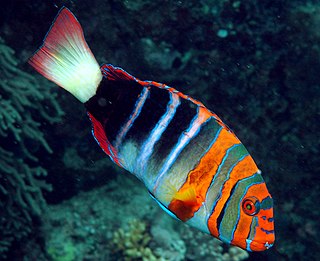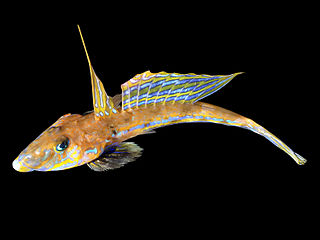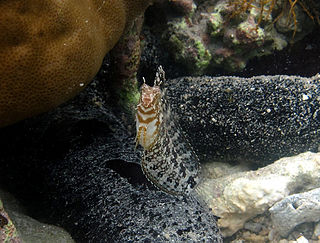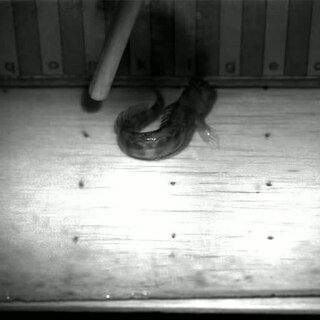
Combtooth blennies are blenniiformids; percomorph marine fish of the family Blenniidae, part of the order Blenniiformes. They are the largest family of blennies with around 401 known species in 58 genera. Combtooth blennies are found in tropical and subtropical waters in the Atlantic, Pacific and Indian Oceans; some species are also found in brackish and even freshwater environments.

Choerodon is a genus of wrasses native to the Indian Ocean and the western Pacific Ocean. They are commonly referred to as tuskfish, because most species have sharp tusk-like teeth.

Helcogramma is a genus in the triplefin family Tripterygiidae. The blennies in the genus Helcogramma are found throughout the Indo-Pacific and in the South Atlantic Ocean off the islands of St Helena and Ascension.

Malacoctenus is a genus of labrisomid blennies native to the eastern Pacific Ocean and the Atlantic Ocean.

Barbodes is a genus of small to medium-sized cyprinid fish native to tropical Asia. The majority of the species are from Southeast Asia. Many species are threatened and some from the Philippines are already extinct. A survey carried out in 1992 only found three of the endemic Barbodes species, and only two were found in 2008. Several members of this genus were formerly included in Puntius.

Bathygobius is a circumtropical genus of fish in the family Gobiidae.

Callionymus is a genus of dragonets found mostly in the Indian and Pacific oceans with a few species occurring in the Atlantic Ocean.

Ecsenius is a large genus of fish in the family Blenniidae. Several species, including Ecsenius midas, the Midas blenny, and Ecsenius bicolor, the bicolor blenny, are commonly sold at aquarium stores as pets.

Blenniella is a genus of combtooth blennies found in the Pacific and Indian Oceans.

Cirripectes is a large genus of combtooth blennies found throughout the Pacific and Indian oceans. Cirripectes biconvexus, an otolith based fossil species from the Burdigalian (Miocene) of southwestern India is probably the earliest record of this genus.

Istiblennius is a genus of combtooth blennies found in the Pacific and Indian Oceans. The generic name is a compound noun composed of istio the Greek for "sail", referring to the high dorsal fin of the type species, Istiblennius muelleri, and blennius which is derived from a word for "mucus" and refers to the scaleless bodies that characterise the Blenniidae.

Omobranchus is a large genus of combtooth blennies found in the Pacific, Atlantic, and Indian oceans.

Parablennius is a diverse genus of combtooth blennies found in the Atlantic, western Pacific, and Indian Ocean.

Petroscirtes is a genus of combtooth blennies found in the western Pacific, and Indian oceans. Some species of this genus have venom that interacts with opioid receptors. Adults usually inhabit coastal reefs and estuaries to depths of about 10 meters, but they can also be found up to 15 meters in depth in sandy and weedy areas among clumps of Sargassum or other seaweeds in coastal and lagoon reefs. They can be found in nests inside small-necked bottles and abandoned worm tubes or shells.

Praealticus is a genus of combtooth blennies found throughout the Pacific and Indian oceans.

Cryptocentrus, also known as Watchman gobies, and one of the genera known as shrimp gobies or prawn gobies, is a genus of gobies native to tropical marine waters of the Indian and Pacific oceans.

Ostorhinchus is a genus of ray-finned fish in the family Apogonidae native to the Indian and Pacific Oceans.

Salarinae is one of two subfamilies in the combtooth blenny family Blenniidae, it is the largest of the two subfamilies in the Blennidae with 43 genera. The species in this subfamily are mainly marine, with a few species which are found in freshwater or brackish water, and a few species are known to spend much time out of the water.


















